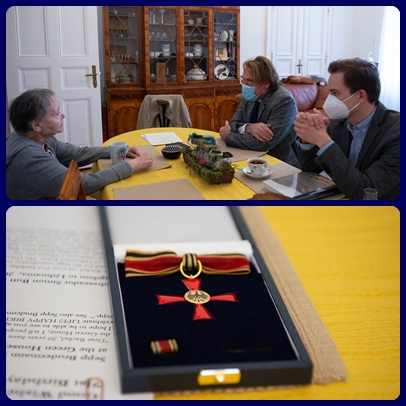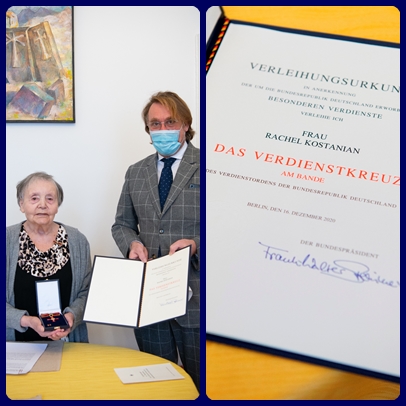◊
The following press release was received today from the office of Lukas Welz, chairman of the board of AMCHA Germany, who nominated Rachel Kostanian for the Order of Merit of the Federal Republic of Germany. Contacts: Email: info@amcha.de. Twitter: @amchade. Facebook: www.facebook.com/amcha.deutschland.
See also: Defending History’s report on the event; tributes and good wishes published on Ms. Kostanian’s 91st birthday; and DH’s Rachel Kostanian section.
◊
Rachel Kostanian Awarded the Order of Merit of the Federal Republic of Germany
◊

From left: Rachel Kostanian; Andreas Görgen, head of the Directorate-General for Culture and Communication of Germany’s Federal Foreign Office; Lukas Welz, chairman of AMCHA Germany. Below: The Order of Merit. Photos: Florian Krauss for AMCHA Germany.
◊
BERLIN—Rachel Kostanian was awarded the Order of Merit of the Federal Republic of Germany on February 9, 2021 in Berlin for her lifelong work in researching and remembering the Holocaust in Lithuania. For a quarter century she was director of a small but world-renowned and unique Holocaust museum in Vilnius, Lithuania, known as The Green House that she co-founded as Soviet rule was crumbling in the late 1980s.
Rachel Kostanian survived the Shoah as a Jew by fleeing to the USSR with her mother in the first days of Barbarossa in June 1941 (her father was shot during his own attempt to flee). It was not until perestroika that she was able in Vilnius, where she had worked as a lawyer and then an English instructor for decades, to reconnect with her Jewish roots, and work to preserve and teach the heritage of Judaism, which had been largely destroyed in Lithuania. She remained uniquely and unbendingly committed to the historical, very painful truth about the massive local Holocaust collaboration, which ironically became much more difficult after independence. She invested decades of energy into promotion and advancement of education, research and remembrance of the Holocaust. She opposed all forms of instrumentalization, denial, revisionism and the ubiquitous attempts to recast the local perpetrators as nationalist heroes. On numerous occasions, she stood up for the truth, in opposition to powerful forces, at great personal cost. The 2012 film Rewriting History and the 2016 documentary Lisa ruft! chronicles some of her efforts, and she won repeated public support from, among others, the late Sir Martin Gilbert in London.
As co-founder and long-time director of the Green House in Vilnius, the only museum in Lithuania devoted exclusively to the Shoah, she joined with figures such as Vilna Ghetto survivors and partisan veterans Fania Brantsovksy and Rachel Margolis to create a place dedicated to assembling authentic records of the historic truth and the successful presentation to the public The Green House is dedicated solely to the representation of Jewish life in Lithuania and its extermination by the German Reich and its local collaborators. Approximately 95 percent of the Lithuanian Jewish population was murdered between June 22, 1941 and the liberation of most of Lithuania in July of 1944. The overwhelming majority were murdered during the first six months (the second half of 1941).
On February 9, Rachel Kostanian was awarded the Federal Cross of Merit on Ribbon. Representing the Federal President who signed the commendation, Dr. Frank-Walter Steinmeier, was Andreas Görgen, head of the Directorate-General for Culture and Communication of Germany’s Federal Foreign Office, who arranged for the presentation of the Order in private, due to the pandemic, at her residence in Berlin, where she retired to live with her son in recent years. Her 91st birthday had just been celebrated, with tributes coming in from the former British, Irish and Norwegian ambassadors to Lithuania.
Her unbending commitment to truth against efforts to whitewash collaborators and perpetrators strengthened international recognition for the Green House, which received scant state financial support and, under her leadership, gained international recognition as a quasi-autonomous unit of the much larger Jewish State Museum.
Rachel Kostanian: “Unfortunately, people in Lithuania were and are not so happy with the work we did at the Green House. So I am not so used to such honours and attentions. So I appreciate all the more this appreciation after decades of pain and tears.”
Lukas Welz: “Rachel Kostanian sought out and found, collected and preserved evidence of earlier Jewish life in Lithuania, made available important sources on the Shoah and Jewish Vilnius and Lithuania. In the post-Soviet period, when Jewish identity was allowed to become visible again, she promoted recognition of the fate of other survivors of the Shoah in Lithuania. For decades, her work has contributed significantly to a deeper understanding of the Shoah in Lithuania in all its facets, and her work has encouraged Jews, survivors and descendants to come to terms with their Jewish identity in a stronger and more self-confident way.
This award in a time of increasing relativization and denial of the Shoah not only honours Kostanian’s work. It also sends a clear message about the need for self-critical engagement with the Shoah across generations.”
Dovid Katz: “For three decades, Rachel Kostanian played a unique and inspiring role in Holocaust remembrance and education, while becoming a key figure in the struggle to interpret history during a period of revisionism that engulfed much of post-Soviet Eastern Europe. With youthful vigour and unflinching, unhurried persistence (during the time in life when others retire!), she built the Green House Museum, Lithuania’s only authentic Holocaust museum, into a local and international address of knowledge, learning, and reflection. Even when she had to fight waves of revisionism, and not infrequently became a target herself. Yet she would not be dissuaded from her mission to educate the thousands of Lithuanian schoolchildren who visited the museum, and thousands more visitors from all parts of the world. She insisted on a room devoted exclusively to pre-war Yiddish civilization, both religious and secular of Lithuanian Jewry, for her a necessary component of any Holocaust museum.
“As long as they were still with us, Vilnius survivors would gather there for a cup of coffee, allowing visitors to receive direct intimate accounts and replies. Much of Rachel’s work — publications, exhibitions, films, recorded tours and lectures — urgently needs to be collected and preserved for future generations. And as for me personally, I never forget that she was my first teacher and mentor in the defense of history.”
*
About Rachel Kostanian
Rachel Kostanian was born the only child of Joseph Dantzig and Bluma Zivelchinsky in Šiauliai (Yiddish Shavl), Lithuania. Her father was a lawyer and worked as a judge in Šiauliai from June 1940 after the Soviet occupation of Lithuania.
After the German invasion of the Soviet Union in June 1941, Rachel and her mother were evacuated to the Soviet Union along with other families of fleeing state employees. They lived in Gorky until Rachel, due to the poor supply situation in the Soviet Union, was sent to a children’s home in the Urals with 200 other Lithuanian Jewish and non-Jewish children. Only at the end of 1944, after the advance of the Red Army to the West, did she return to Gorky and meet her mother again.
At the end of the war, mother and daughter returned to Lithuania, and settled in Vilnius, then capital of the Soviet Republic of Lithuania. They learned only here that her husband and father, Yosif Zivelchinsky, had been murdered in the first days.
Her mother, Bluma Zivelchinsky, worked in a library, where Rachel as a child spent her free time after school. After finishing high school, she pursued a law degree. She completed further studies in English at the Pedagogical Institute in Vilnius and met her future husband, Genrich Kostanian. After the wedding, they both moved to his native Armenia. In 1960, the family returned to Vilnius. Rachel Kostanian worked as a translator and English teacher.
An event in 1987 changed her life fundamentally. In Kaunas, Lithuania’s second city, survivors of the Kaunas (Kovno) ghetto, who were also involved in the Lithuanian independence movement, opened for the first time an exhibition on former Jewish life. Practices previously lived only in private and mourning for those murdered in the Shoah met for the first time with a truly interested public, including non-Jewish Lithuanians Survivors met for the first time.
In 1989, as part of the process of perestroika, the autonomous new Lithuanian authorities approved the establishment of a Jewish Cultural Society, which, among other things, began to build a Jewish Museum. Rachel Kostanian became a research associate. Together with other survivors of the Shoah, they created the first exhibition commemorating Jews murdered in the Shoah and Vilna’s pre-war Jewish culture. The Green House, formerly a Soviet museum, opened in 1991. The Lithuanian government returned two other buildings to the Jewish community. The small, hidden wooden Green House remains the city’s only museum devoted to the Shoah. It is hardly visible from the street. Its internet-presence is part of the main museum’s website.
In 1996, together with Salomonas Atamukas, she published a history of the Jewish Museum in Vilnius. In 2002, her monograph Spiritual Resistance in the Vilna Ghetto appeared with a preface by Martin Gilbert. A collection of posters produced in the ghetto wich she co-edited appeared under the title Vilna Ghetto Posters (1999 and 2006).

Andreas Görgen, head of the Directorate-General for Culture and Communication of Germany’s Federal Foreign Office presents Rachel Kostanian the Presidential Order of Merit, signed by Germany’s president. Lukas Welz, chairman of AMCHA Germany was there. Photos: Florian Krauss for AMCHA Germany.
Lukas Welz is Chairman of the Board of AMCHA Germany and nominated Rachel Kostanian for the Order of Merit of the Federal Republic of Germany. He has worked as policy advisor to the Conference of Jewish Material Claims against Germany and in the Bundestag on Antisemitism, Anti-Roma prejudice, Compensation for NS Crimes, German-Israeli Relations; he supported aid for thousands of Holocaust survivors and their descendants in Israel; in this position curated Devoted to Life, and the Present Past program on transnational exchange on psychosocial aid after collective violence. He also worked in Cambodia and Vietnam on Transitional Justice. Did his civil service at Yad Vashem and with Holocaust survivors in Jerusalem.
*
Andreas Görgen is head of the Directorate-General for Culture and Communication of Germany’s Federal Foreign Officeion at the German Foreign Office. He made the personal presentation of the Order of Merit to Ms. Kostanian on behalf of Federal President Dr. Frank-Walter Steinmeier.
*
Dr. Dovid Katz is a scholar of Yiddish and Lithuanian Jewish culture who has published widely; for many years he was professor at Vilnius University. He is a long-time confidant of Rachel Kostanian and editor of the online journal Defending History.
◊
Contacts:
Email: info@amcha.de
Twitter: @amchade
Facebook: facebook.com/amcha.deutschland
◊